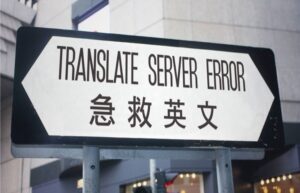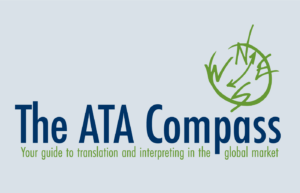Using AI for Language Translation: Context is Everything

Using AI for Language Translation: Context is Everything
Without a doubt, artificial intelligence provides exciting opportunities for us to innovate and automate tasks in our professional and personal lives. And AI can seem almost magical when it comes to languages, seamlessly converting information at the click of a button.
But is AI always a safe and effective tool for language translation? Experts note concerns with using AI for translation, including privacy, accuracy, and legal implications.
While AI can certainly be helpful, in some contexts, it can also be risky. Continue reading for insights from Ben Karl, a professional translator of French and Mandarin to English and chair of the American Translators Association’s Advocacy Committee.
AI translation for international travel
Q: Is it OK to use AI to translate things when traveling internationally?
A: Yes, but it’s important to understand that context is key. In many situations, it’s likely perfectly fine, like reading a timetable in a train station, deciphering an informational sign at a tourist site, or reading a basic menu. It gets trickier the higher the stakes are, because AI can be notoriously inaccurate when it comes to translation. Are you checking a menu to see if a dish contains a potentially dangerous allergen, or trying to inform someone about your medical condition? Are you trying to communicate with law enforcement or other officials, or to convey information that could have a serious impact on you? In cases where an AI mistake could be costly—or even deadly—you would do better to rely on the services of a trained professional.
Note: While AI can provide useful information when traveling, use caution when making decisions about international travel and your personal documentation. A recent People article reported that a person was denied entry to her travel destination because AI incorrectly told her that she did not need a visa.
Business applications of AI
Q: How can AI be helpful for international market research?
A: The internet is a treasure trove of useful information, and if AI is good at one thing, it’s summarizing existing information. To conduct research on international markets, AI tools can be an essential resource to accelerate the discovery process.
However, while AI can compile excellent summaries, it is still prone to errors. Google AI famously recommended using glue to affix cheese to pizza, and that’s just one example. If you’re planning the major step of internationalizing (and localizing) your product or service for another market, nothing beats real human expertise. At the very least, validate your findings with in-country experts before making a decision that could put your business on the line.
Q: How can I use AI to share my content with people who speak other languages?
A: Most social media platforms already have built-in machine translation features to help your content reach a wider audience. In the context of social media, the risk of reputational damage due to these tools is low: if anyone is going to catch flack, it’s the social media platform, not the creator.
But the tables are turned if a creator or brand misuses AI translation in an official post, and the response may be swift: the campaign for Alexandria Ocasio-Cortez posted gibberish Arabic posters online, causing a swift backlash. Again, whenever your reputation is at stake, verify all content, in every language, as carefully as the original post.
High stakes: legal and medical settings
Q: What about using AI for language interpretation in high stakes situations, like in courtrooms or doctor’s offices?
A: As I mentioned above, context is key and things change when the stakes are high. You may have heard of what is now commonly called “AI interpreting.” It sounds so simple, but it’s actually several technologies rolled into one: a speech-to-text engine that transcribes spoken text, a machine translation engine that translates that text from one language to another, and a text-to-speech engine that reads the translation aloud. With each step, the risk of potential errors increases exponentially, but the users of the technology are none the wiser: they only speak one of the languages in question.
If you’ve ever experienced AI interpreting, it probably amazed you. Like the first time you asked ChatGPT a question. But what sounds like fluent interpreting often deviates considerably from the original speakers’ words. In settings like a train station overseas, the consequences of an error are relatively low: you might miss your train or find yourself in an unexpected destination. Inconvenient, but normally not life-threatening. In a courtroom or doctor’s office, an error could be dire, resulting in expensive mistrials or terrible wrongful convictions in our courts or misdiagnoses and even death in our hospitals. The truth is that AI simply isn’t suitable when it comes to high-stakes interpreting.
For more on this topic, check out Think AI Should Replace Interpreters? Think Again.
Professional translators ensure accuracy and safety
Bottom line? “If sales, reputation, jobs, etc. are on the line, the cost of hiring a professional translator or interpreter is likely far less than the cost of it blowing up in your face,” says Karl. “It’s almost like an insurance policy.”
Check out ATA’s Guides to Buying Language Services–-one for buying translation services and one for buying interpreting services. Yes, there are some similarities, but a lot of differences. They can help you through the process step by step. To find a professional translator or interpreter, visit the ATA Language Services Directory.
About the Author
 Meghan McCallum is an ATA-certified French to English translator and writer specializing in corporate communications, marketing, and international development. She is also an active volunteer for the American Translators Association. The American Translators Association represents almost 9,000 translators and interpreters in more than 100 countries. To hire a translation or interpreting professional, please visit www.atanet.org/directory.
Meghan McCallum is an ATA-certified French to English translator and writer specializing in corporate communications, marketing, and international development. She is also an active volunteer for the American Translators Association. The American Translators Association represents almost 9,000 translators and interpreters in more than 100 countries. To hire a translation or interpreting professional, please visit www.atanet.org/directory.
Language Services Directory
Subscribe to The ATA Compass
Connect with The ATA Compass
Recent Posts
Why Should I Hire a Professional?
It takes more than just the ability to understand two languages. Professional translators and interpreters have the education, experience, and expertise to understand the nuances in one language and transfer…
Read More about Why Should I Hire a Professional?What is a Certified Translation?
What are the basics of a certified translation? In the United States, anyone can certify a translation. A translator does not need to be certified in order to provide a…
Read More about What is a Certified Translation?Translator vs. Interpreter
Watch a Day in the Life of Translators and Interpreters See how translators and interpreters work in this short animated video. Translators do the writing Translators work with the written…
Read More about Translator vs. InterpreterLanguage Services Directory
Start Your Search ATA’s Language Services Directory includes a list of all ATA members of individuals, as well as companies. Need help finding the right professional? Professional translators and interpreters…
Read More about Language Services DirectoryBuying Language Services
Guide to Buying Translation Services Translators help power the global economy, working with businesses, governments, non-profits and individuals. Translators work with the written word. The ATA Guide to Buying Translation…
Read More about Buying Language ServicesThe ATA Compass
Want to reach more customers, grow your business, and improve your bottom line? The ATA Compass publishes articles and provides resources to show you how language professionals can help you…
Read More about The ATA Compass






